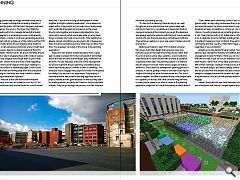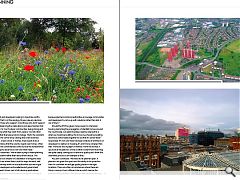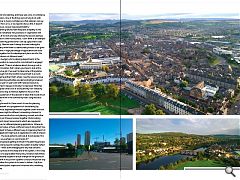Planning: Turf War
15 Jul 2015
A spate of controversial planning decisions have prompted calls for a shake-up of the service, prompting the RTPI to pursue a fresh drive to improve the system. Urban Realm takes a look at what the institute proposes and where it might lead. Can the planning system reconcile the conflicting demands placed upon it with resources shrinking?
The planning system may be caught between a rock and a hard place as it seeks to bridge the competing interests of developers and the public but that hasn’t stopped continued efforts to improve the service. The Royal Town Planning Institute is leading efforts to manage demands that public opinion be listened to in a planning process constrained by shrinking budgets. A spate of controversial planning decisions have prompted calls for a shake-up of the system and the RTPI is pursuing a fresh reform drive prompting Urban Realm to look at what is being proposed and to ask where it might lead.Craig McLaren, director Scotland & Ireland at the RTPI, told Urban Realm: “We’ve heard a lot about charrettes, they’re being seen as a way of engaging those with a stake in a place fairly early in the design process to get them to put in their vision and plan. There’s more and more of that happening rather than, what used to happen in the past, meeting in a draughty church hall on a Wednesday night. Council’s and planning authorities are moving away from those set piece public meetings to charrettes and social media to create a natural dialogue rather than a process.”
Douglas Peacock of the Save North Kelvin Meadow campaign group, who was once taken to court by GCC for erecting raised flower beds and bat boxes on council owned land, said: “Lack of time is a big issue for people to come together and fight a planning application. You’re allowed to object within 21 days which isn’t enough notice. Most people don’t understand the planning process at all, they need time to come together and prepare valid objections. Also community councils, which are usually quite vocal on these things, normally only meet once a month. If the deadline has already passed, sometimes you are given a bit of leeway but there should be something in policy which says we allow more time. The developer has loads of time to put in the planning application.”
Peacock’s own interest in planning stems from a seven year crusade to prevent 90 homes being built on brownfield land in the west end and acknowledges early notification of the work. He said: “Because of the size of the development we were brought into the pre-planning consultation phase which was introduced for schemes of over 50 dwellings. The developer had to engage with people for a three month period but really it’s lip service in our experience. They employ a consultant whose very skilled in the language they use on a project website and we gave feedback on that but they didn’t do anything about it and they don’t have to, they’re only there to listen. They can go through the process, nod their head and not abide by anything you say.
“It’s like much in planning, there are lots of very well thought out and worded policies but unfortunately with nothing to show for it. I would like an independent body to oversee it because at the moment you’ve got the developer who always wants the outcome with the most money and the council who own the land, planning committee and officials. They will never really be on your side unless it makes sense for them to be.”
Backing up Mclaren’s views RTPI Scotland convener Pam Ewen, told Urban Realm that resources were now being focussed on the beginning of the process rather than the end, as well as using video, graphics, social media and even Minecraft to communicate with as broad an audience as possible. Ewen said: “The planning system in Scotland is about trying to front load. That’s where people can make a difference. That’s what our development planning process is all about, it’s about getting in there at the main issues report stage and flushing out what the main issues are. That didn’t used to happen. We have to promote the fact that people have the capability to do that, that’s the constant thing we need to make people aware of so when it comes to the planning application stage that isn’t the first time they’ve heard about it.
“That’s where your community council’s and interest groups really can play a big role because they’ve got an ownership aspect for those communities to say this development plan consultation is coming up, now is your chance. You will complain about something before you praise it, I do. That’s human instinct, it’s drilled into us. What we need to do is celebrate more the fantastic buildings that are created in Scotland. People are more confident, they want a say in their community and their country. I think that’s hugely encouraging regardless of your profession.”
Weighing into the debate McLaren added: “Sometimes planners get criticised for thinking consultation and engagement is a pain for them. I think you can counter that with the fact that 20 per cent of our members volunteer for planning aid. I don’t know of any other profession where a fifth of their members volunteer in that process in their own time. The other thing is you need to always divorce the system and the process from the decision because some people will always be unhappy because the decision isn’t right. The key thing we need to do is ensure that process allows them to engage.”
Asked if the profession was stuck between a rock and a hard place with Nimby’s ranged against any and all development and developers looking to maximise profits, Ewen said: “That’s not the anology I’d use. Like any decision there will be those who support it and those who don’t support it. It’s about balancing the implications and opportunities that arise from it. For me it’s about communities being strong and understanding what they want from a place - but also that acceptance that their place has to change. That’s the constant. Whether it’s the corner shop closing and a new business coming in or a new school or homes, there needs to be a strong acceptance that the country needs new homes. Often this is where the controversies come out but the fundamental thing is everyone deserves a roof over their head.”
McLaren observed: “We’ve been trying to make planning more collaborative rather than about them and us. The planner’s role is an enabler or a facilitator to bring the sides together and see where there could be ways forward. Half of our membership work for local authorities but we’ve got members in developers and academia and government agencies as well. 94 per cent of all planning applications are approved and I’m sure the reason the figure is so high is because planners and local authorities encourage communities and developers to come up with solutions rather than kick it out of town.”
Should the RTPI be given more powers to champion housing stemming the propagation of identikit homes around the countryside. Can planning take a lead by saying this is what we should be building, this is how we should be building and knock some heads together to see that it’s done? Ewen responded: I’m not sure there has been a failure of architects or developers to deliver on housing, it’s a bit more complex than that. There are lots of players involved. I think we do that, if you look at the planners of the Scottish Government then they are quite clearly coming out in favour of quality and I think the charrettes process is an example of that.”
McLaren continued: “We need to let planners plan. If planners are given the space and the ability to be proactive then I’m confident we will get quality places in the right locations. There are often circumstances where there are things coming in from different places which narrow the planners ability do that. Over the past few decades planning has taken a bit of a bashing, and there was a loss of confidence in the profession. One of the things we’re trying to do with #happyplanner is inspire confidence so that planners can say this is a yes, this is a no, or we need to discuss this. It doesn’t need to be a yes, we just need predictability.”
Have planning failures have fed public antipathy to the sector? Ewen remarked: “Any business or organisation will always look at its work and say what are the lessons learned, that’s intrinsic in a well-run business. I can’t think of an example where as a planning professional I can say ‘geez that’s been done wrong’. Planners aren’t always the ones making the decisions, very often there is a democratic process to be gone through as well. A high percentage of applications are done through delegation but the development plans are all in the hands of politicians at different levels.”
But with budget cuts to planning departments is the sector in a position to resource this commitment to engage? Ewen answered: “There is a balance about do we go out to 10 or 30 communities, that’s where you have to look at the resources we’ve got. If we want to take some of the policies coming through from the Scottish Government to a much more detailed level then that’s where I see the resource issue kicking in. Planning authorities are demonstrating increased performance year on year even with reduced resources. The quality hasn’t slipped, ironically it’s improved. What has perhaps slipped is that a lot of local authority non-statutory work has had to stop as finances tighten to focus on the statutory requirement. If the decision is taken that we do much more detailed work in the community that’s a big resource commitment.”
Looking forward McClaren wants to see the planning profession embark on a programme of ‘decluttering’ by bringing various disparate processes together under one roof. He said: “There might be different consenting schemes for instance a road construction and planning consent and other ways we can join those processes together. We’re looking at the different impact assessments which are required at different times for different planning applications. Where do they add most value, is there a different way of doing that? Are they all needed? Is there a different way of organising them? At present an applicant might put an application in with an impact assessment. The local authority will look at it and decide if it is right. Could you perhaps co-commission it?”
With more people getting involved in the planning process there is a growing need to reshape the system to better reflect their needs - whilst acknowledging the very real concerns harboured by those at the sharp end of the system. A first step toward that is to appreciation that policy, however well written, doesn’t necessarily equate to actual change on the ground. In that light a shift in focus from systems to results would not only deliver but allow the system to be seen to deliver. Only then can deep rooted public scepticism be turned into something more positive.
|
|
Read next: Eric Parry: Lost Streets
Read previous: Paul Stallan: Peripheral Vision
Back to July 2015
Browse Features Archive
Search
News
For more news from the industry visit our News section.
Features & Reports
For more information from the industry visit our Features & Reports section.






